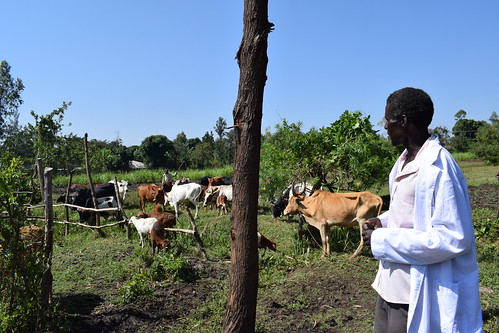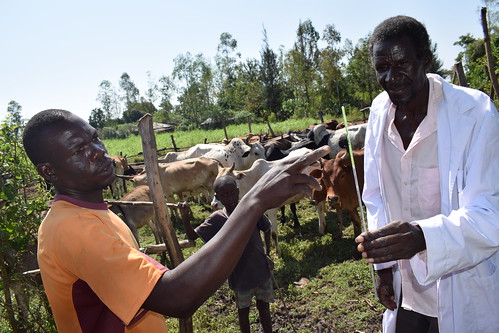The western region of Kenya is not a traditional dairy production area, although having significant resources that can support dairying. One of the challenges that hinder farmers’ entry into this profitable industry is the use of local breeds of cattle with low productivity. Additionally, in most cases cattle in smallholder settings are predominantly ‘multi-functional’ used for various purposes such as pulling ploughs.
While most farmers in this region would like to engage in productive dairy farming and gain competitive advantage, they are not able to access improved high productive breeds of cattle. This is mostly due to the associated high costs of obtaining a improved breed and the delicate nature of improved breeds (high vulnerability to animal diseases).
Since its inception at the start of 2016, the dairy component of the Feed the Future Kenya Accelerated Value Chain Development (AVCD) program has provided opportunities for more households in western Kenya to tap into the lucrative dairy products market in Kenya.
Through the International Livestock Research Institute (ILRI), AVCD is promoting accelerated breeding in smallholder farming systems through fixed-time artificial insemination (FTAI).FTAI technology involves synchronizing the reproductive cycles of clusters of animals through hormone therapy followed by mass artificial insemination.
By targeting a large number of animals for oestrus synchronization, particularly cows of indigenous breeds, the technology ensures that large sets of households adopt improved dairy cows and enter the lucrative dairy value chain.
Romanus Babulare, a farmer from Kajulu area in Kisumu County, is one of the famers who has benefited from the AVCD technological interventions. While he has a large herd of more than 50 indigenous cattle, he has had the desire to acquire improved breeds to allow him venture into dairy farming. “The FTAI technology was very timely since I had already started exploring other options of acquiring improved breeds, with this subsidized support my animals will deliver improved dairy animals that will not only help me but my children’s children!” commented Romanus. “This is really going to kick start the dairy farming in this village, now we can bulk our milk since our animals will grow together. I am excited!”
While artificial insemination has been around for a long time, not many livestock farmers in the region have been using the service. The low demand for AI services is a result of a scarcity of improved dairy cows, which kept the cost of the service high for the few farmers interested in it and kept the profit margins low for the service providers.
AVCD is providing the FTAI service freely to farmers who have demonstrated interest in dairy production and who are willing to pay a registration fee to the county governments for purposes of follow-up and sustainability
This technology will provide the much needed motivation for farmers to venture into dairy production in western Kenya.


Am James Wandera, an animal health student at Kenyatta university. I like the AVCD program and I have participated personally on sensitizing farmers. I hope and majority of farmers hope AVCD program will be there for a long period of time until they get the second generation calves.
LikeLike